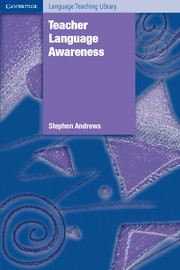Book contents
- Frontmatter
- Contents
- Acknowledgements
- Introduction
- Prologue: The challenge of being ‘language-aware’
- 1 Language Awareness, ‘Knowledge About Language’ and TLA
- 2 TLA and the teaching of language
- 3 TLA and the ‘grammar debate’
- 4 TLA and teachers' subject-matter cognitions
- 5 TLA and pedagogical practice
- 6 The TLA of expert and novice teachers
- 7 TLA and the native-speaker and non-native-speaker debate
- 8 TLA and student learning
- 9 TLA and teacher learning
- Epilogue: TLA and teacher professionalism
- Appendix
- References
- Index
- Publisher's acknowledgements
Epilogue: TLA and teacher professionalism
Published online by Cambridge University Press: 30 July 2009
- Frontmatter
- Contents
- Acknowledgements
- Introduction
- Prologue: The challenge of being ‘language-aware’
- 1 Language Awareness, ‘Knowledge About Language’ and TLA
- 2 TLA and the teaching of language
- 3 TLA and the ‘grammar debate’
- 4 TLA and teachers' subject-matter cognitions
- 5 TLA and pedagogical practice
- 6 The TLA of expert and novice teachers
- 7 TLA and the native-speaker and non-native-speaker debate
- 8 TLA and student learning
- 9 TLA and teacher learning
- Epilogue: TLA and teacher professionalism
- Appendix
- References
- Index
- Publisher's acknowledgements
Summary
The preceding chapters of this book have argued that TLA is of crucial importance in the language teaching / language learning enterprise, because of its potential impact on student learning: the language-aware L2 teacher is more likely to be effective in promoting student learning than the teacher who is not language-aware. The language awareness of the L2 teacher has been explored from a variety of perspectives, and illustrated with snapshots from L2 English classrooms in the specific context of the Hong Kong secondary school. Now, in these final few pages, I feel it is important to return once more to the motivation for writing such a book, and to set its central argument within the context of more general educational debate.
The arguments in this book – that Teacher Language Awareness (TLA) is a core component of the L2 teacher's knowledge base and that it is a growing concern for those involved in setting professional standards for L2 teachers – accord with wider trends, both in language education and general education, associated with the establishment and maintenance of professional standards. These include, for instance, the various moves in recent years towards the professionalisation of TESOL (among them the ill-fated BIELT, the British Institute of English Language Teaching, set up with the goals of establishing a framework of professional qualifications and a professional code of practice), the initiatives in various parts of the world to set professional standards for teachers of all subjects (such as the frameworks developed by the National Board of Professional Standards in the United States) and the growth of interest in the generic notion of the teacher as professional that is evident in the education literature (see, eg., the various papers in Darling-Hammond and Sykes, 1999).
- Type
- Chapter
- Information
- Teacher Language Awareness , pp. 200 - 204Publisher: Cambridge University PressPrint publication year: 2007



